Six decisive points that changed Syria's war
- Published
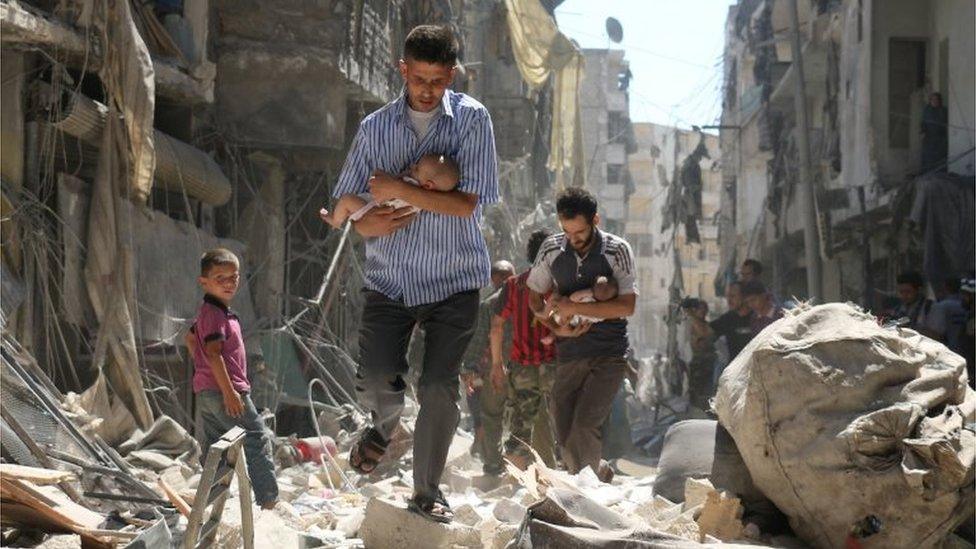
The war has devastated large parts of the country, and countless lives
The fighting in Syria is entering its seventh year, with no real end in sight.
What began as calls for change on the streets swiftly became a multi-national battleground, which has left more than 300,000 people dead and millions displaced.
Here are six decisive phases which have shaped the course of the conflict to date:

From protest to war
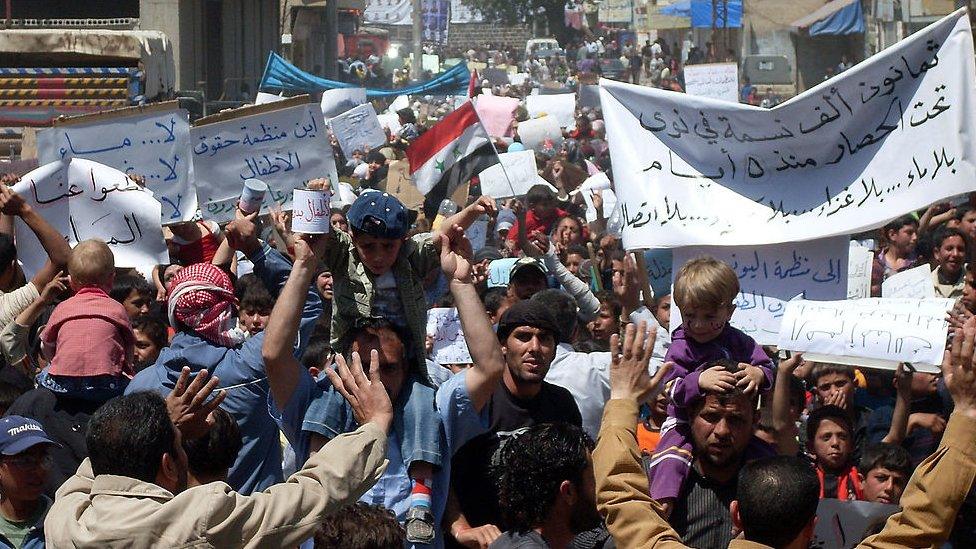
Deraa was one of the first places to see anti-government protests in early 2011
There were almost 18 months between the outbreak of peaceful protests in February 2011 and the point - in July 2012 - that Syria was declared by the Red Cross to be in a state of civil war.
Over this period, the international narrative shifted from one that framed events within the context of the Arab Spring's search for accountability and reform to one of a protracted military conflict.
The Syrian opposition that emerged in this period reflected, and continues to reflect, a broad movement and not a cohesive force.
The government resorted to increasingly violent crackdowns, prompting the establishment of a growing number of armed opposition groups. The Free Syrian Army (FSA) began to form in the summer of 2011, while the key Islamist and jihadist groups such as Ahrar al-Sham and al-Nusra Front were formed in late 2011 and early 2012, respectively.
While the West hesitated over which groups to support, a chaotic influx of funds ensued from regional powers and individual donors in the Gulf and the Syrian diaspora.

Obama's red line
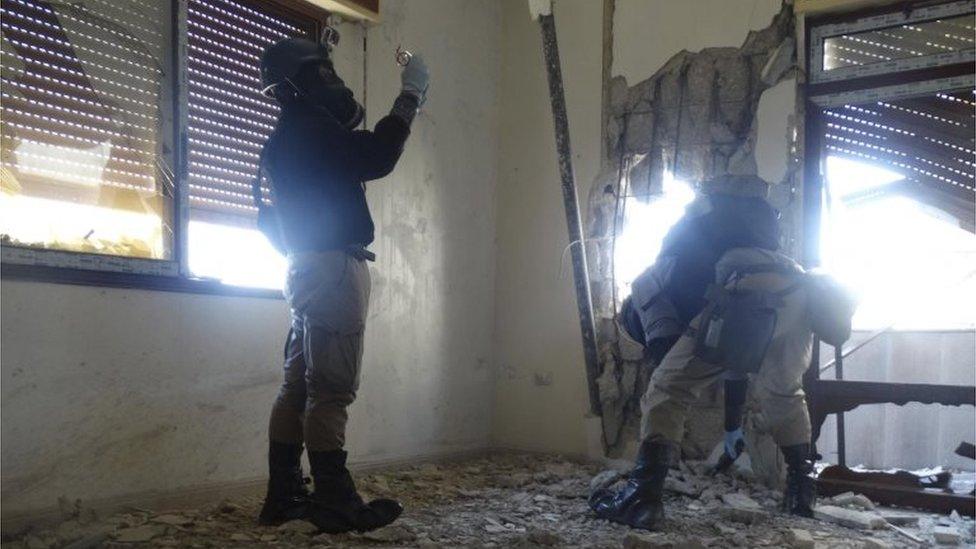
The US failure to forcefully respond to chemical weapons attacks disappointed the opposition
US President Barack Obama had declared in 2012 that the US would punish any use of chemical weapons by the Syrian government.
But when the government was reported to have launched a chemical attack in the Ghouta agricultural belt outside Damascus in August 2013, the US did not intervene and instead accepted an offer from Russia to get Syria to dispose of its chemical weapons.
The Obama administration continued to insist that the deal with Moscow was a better outcome. But on the ground it served to embolden President Bashar al-Assad and his Russian and Iranian allies, as it appeared to legitimise the use of non-chemical weapons.
These events shattered any hopes the opposition and its regional backers had of direct US military intervention. They would also undermine potential US leverage in peace negotiations, as the government and its international backers henceforth operated with little fear of US sanction.

Growth of extremists

Following President Obama's decision not to enforce his red line on chemical weapons, Western support for the "moderate" armed groups was eclipsed by the support of Islamist groups by regional powers Qatar, Saudi Arabia and Turkey.
Even prior to this, some FSA groups had begun adopting a more religious image in order to attract Gulf funding, while some fighters had defected to better-equipped Islamist rivals.
Jihadist groups skilfully sought to exploit the weakness of other groups to increase their power and influence within the rebel movement, sometimes targeting FSA units. Paradoxically, by 2015 this made moderate groups increasingly reliant upon jihadist groups on the battlefield.
The growth of radical groups was further facilitated by the government's battlefield alliances with Hezbollah and other Shia militias, which reinforced the sectarian narrative of Sunni jihadists.

Rise of so-called Islamic State
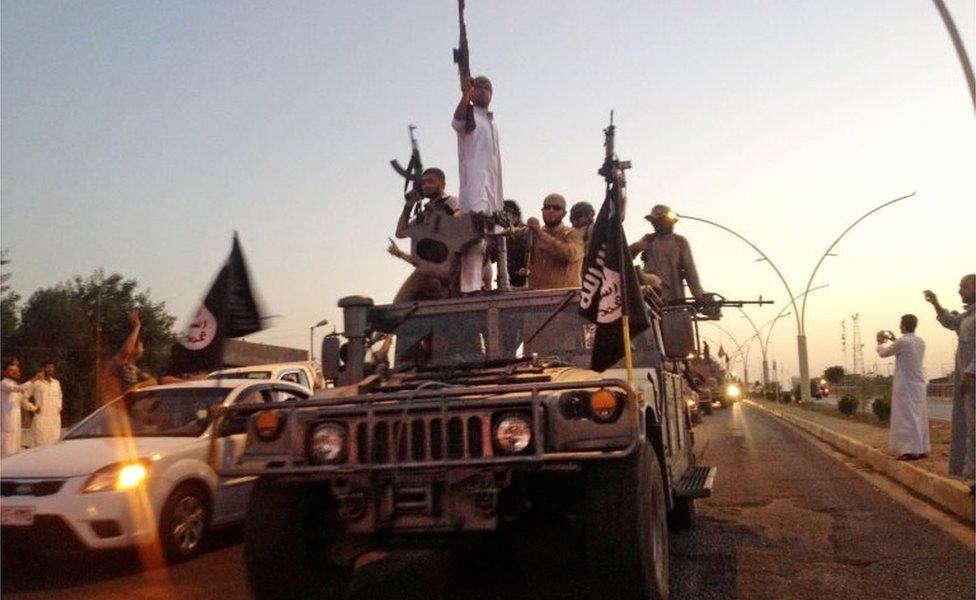
The advent of IS changed the dynamics of the war in Syria
IS entered the Syrian conflict by setting up al-Nusra Front, before announcing a merger with the group in 2013 that was rejected by al-Qaeda. The Syrian government's focus on military efforts against the moderate opposition groups afforded IS room for manoeuvre.
In June 2014, IS announced the formation of its so-called "caliphate", encompassing areas of Syria and Iraq. Defeating IS would soon become the priority in Iraq and Syria for Western powers, leading the West to subordinate the peace process in Syria to an "IS first" policy imperative.
In September 2014, the start of air strikes on IS positions in Syria demonstrated that the West was willing to intervene directly to counter the jihadist group, but not to protect civilians in opposition-held areas from the government's barrel-bombs.
This fuelled a deep sense of betrayal within the Syrian opposition and communicated the prioritisation of a military solution to one of the products of the conflict over the search for a peace settlement that would tackle its drivers.

Russian intervention
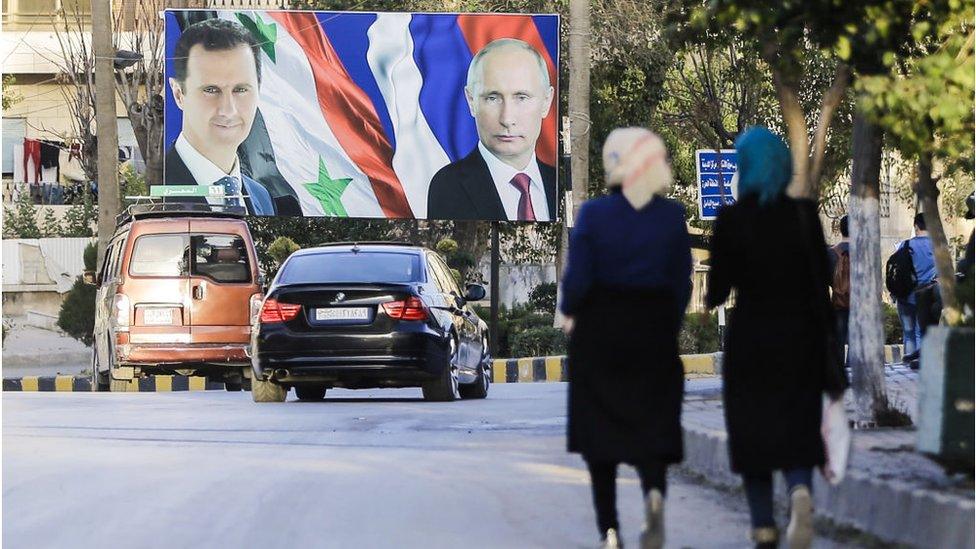
The Russian offensive managed to turn the tide in favour of Assad
Following a string of rebel victories in early 2015 - most notably in Idlib - President Assad was forced to admit that manpower shortages had made ceding territory necessary. Russia calculated that the Syrian government required direct material support to guarantee its survival.
In September 2015, Russian President Vladimir Putin ordered the deployment of Russian forces to Syria. The intervention surprised the international community and immediately tipped the military balance in the government's favour.
Moscow declared its intervention to be aimed at listed terror groups such as IS and al-Nusra Front, but it overwhelmingly targeted more moderate groups, including those receiving US support.
Russia has subsequently become the main arbiter in international peace talks, effectively sidelining the UN and making the US a junior partner in the process.
The Russian intervention has also upped the ante for any form of future Western intervention, as this would bring a real threat of direct combat with Russian forces.

Retaking of Aleppo
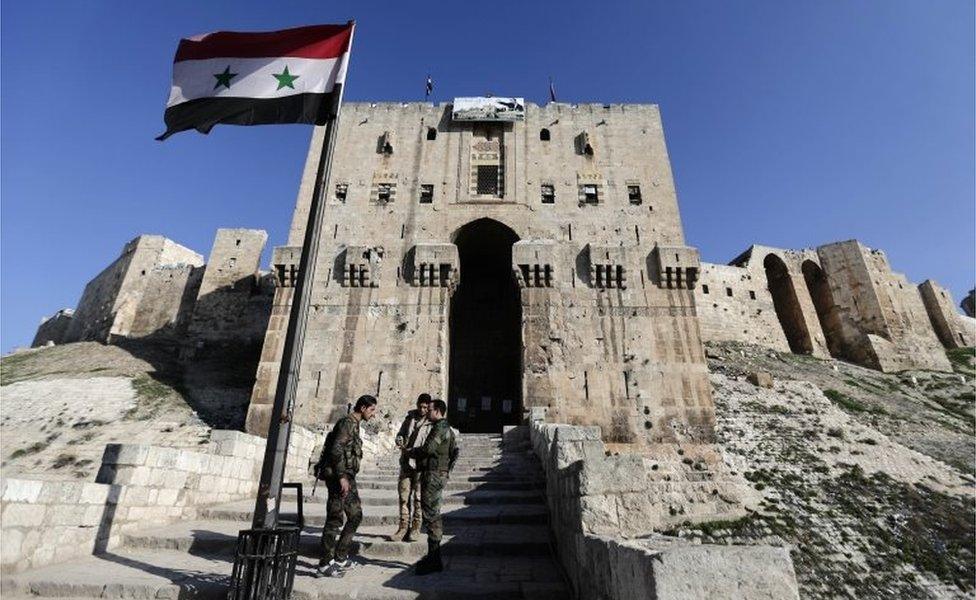
Eastern Aleppo was the rebels' last major urban stronghold until it fell to the government
The recapture of rebel-held eastern Aleppo by the government and government-aligned forces in December 2016 was the most significant victory for President Assad in the conflict to date.
The loss of Aleppo appears to illustrate that the rebels' hopes of overthrowing the Assad regime militarily are at an end. But the government also lacks the capacity to control the whole of the country, meaning that victory will prove a relative term in Syria.
Internationally, events in Aleppo cemented Russia's role as the main external actor in the Syrian conflict. They also resulted in Turkey replacing the US as the key interlocutor with Russia in the last days of the Obama presidency.
With the US and its Western allies having ceded the initiative, it now appears Western marginalisation in Syria could leave Russia and Iran to negotiate with Turkey an eventual settlement to the war.
Tim Eaton is a research fellow with Chatham House's Middle East and North Africa Programme. He manages its Syria and its Neighbours Policy Initiative and is a co-author of the Chatham House report , externalWestern Policy Towards Syria: Applying Lessons Learned. Follow him on Twitter., external